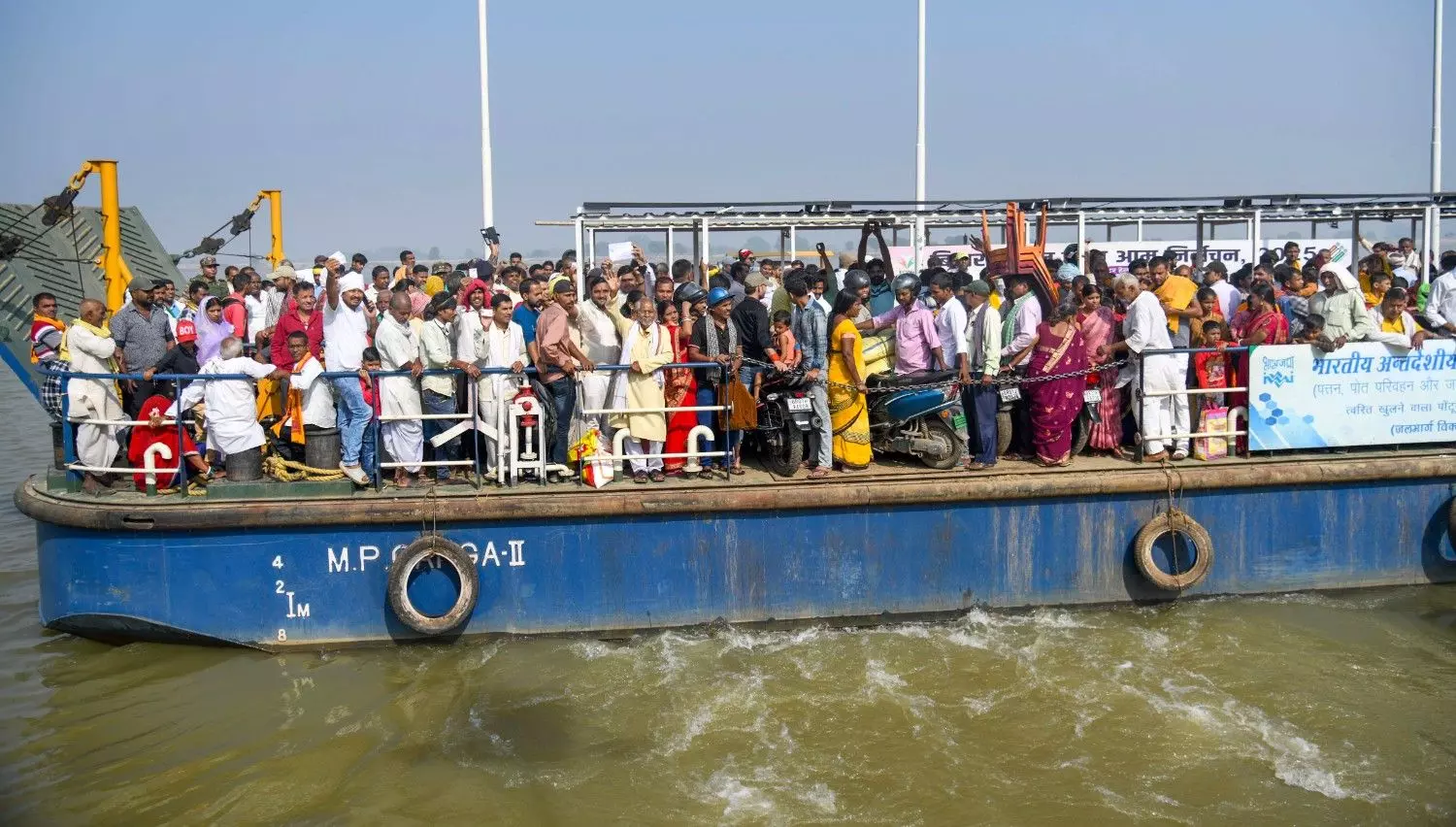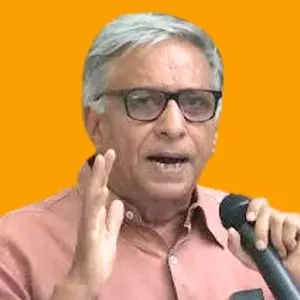
- Home
- India
- World
- Premium
- THE FEDERAL SPECIAL
- Analysis
- States
- Perspective
- Videos
- Sports
- Education
- Entertainment
- Elections
- Features
- Health
- Business
- Series
- In memoriam: Sheikh Mujibur Rahman
- Bishnoi's Men
- NEET TANGLE
- Economy Series
- Earth Day
- Kashmir’s Frozen Turbulence
- India@75
- The legend of Ramjanmabhoomi
- Liberalisation@30
- How to tame a dragon
- Celebrating biodiversity
- Farm Matters
- 50 days of solitude
- Bringing Migrants Home
- Budget 2020
- Jharkhand Votes
- The Federal Investigates
- The Federal Impact
- Vanishing Sand
- Gandhi @ 150
- Andhra Today
- Field report
- Operation Gulmarg
- Pandemic @1 Mn in India
- The Federal Year-End
- The Zero Year
- Science
- Brand studio
- Newsletter
- Elections 2024
- Events
- Home
- IndiaIndia
- World
- Analysis
- StatesStates
- PerspectivePerspective
- VideosVideos
- Sports
- Education
- Entertainment
- ElectionsElections
- Features
- Health
- BusinessBusiness
- Premium
- Loading...
Premium - Events

Indian elections risk becoming rituals without meaning as a compromised Election Commission ensures the die is cast well before the first vote is
In recording a scintillating electoral victory to make his way through to the office of the Mayor of New York City against all odds, Zohran Mamdani has felled even the world’s tormentor-in-chief, Donald Trump, and become the toast of the five continents.
Trump had mobilised the biggest captains of capital against the 34-year-old “democratic socialist” of Indian heritage, and threatened to cut federal funds as a gesture of intimidation.
But, in all likelihood, Mamdani would have cut no ice in Bihar, or even in a Patna Corporation election, if the likes of Narendra Modi and Amit Shah were ranged against him.
Also read: Why Mamdani’s New York win resonates well beyond the City — and the US
Trump is clearly no match for the Wizards of India. For the Wizards, what counts, above all, is the cynicism of desire.
Tainted polls
Their mantra is to hold power at any price, even by subverting the very levers of fair voting, to be able to advance the ideological project of Hindu Rashtra, of which fattening big capital and nursing crony capitalism has become an integral part.
The pretty much wholesale subversion of the electoral system, through conscious moves, becomes fairly clear from Congress leader Rahul Gandhi’s stunning press conference in New Delhi on November 5.
The pretty much wholesale subversion of the electoral system, through conscious moves, becomes fairly clear from Congress leader Rahul Gandhi’s stunning press conference in New Delhi on November 5, in which, using extensive data and analysis, he showed, in a manner that even the blind could see, that the Haryana Assembly election of October 2024 was rigged beyond belief, evidently on instruction from the top, to ensure the defeat of the Congress party.
Also read: Can US-type presidential term limit work for Indian PM, CMs?
The EC’s response has been no less stunning for its dissimulation that the Congress had not complained at the time. Are complaints even possible when the practice of suppressing relevant data has been set in vogue, or when pertinent information is not released when it would matter?
Onus on the EC
The national poll body seems to forget all too easily that, under our Constitution, the onus is on it, as the impartial referee, to deliver to the citizens and the nation a clean election in every respect, and thus maintain faith in the democratic order. This onus does not lie on political parties.
Tainted polls are no polls, but the ‘beauty’ of the Chief Election Commissioner's (CEC) monumental efforts in recent times seems to be to benefit a particular party.
The past two CECs and their colleagues were selected by a government-loaded panel after the Chief Justice of India was removed from the process through a change in the law in December 2022. Naturally, the election daddies have since conducted themselves as if their actions were required to be in fulfilment of the mandate given to them by the government.
They singularly failed to appreciate that they are creatures of the Constitution and their mandate is to secure the sanctity of the polls in the world’s largest democracy. Alas, even in its routine communications, the EC has behaved as though it were a political entity aligned to a particular side and not a vital custodian of the machinery of democracy.
Little room for solace
In the event, even as Bihar votes today (November 6) in the first stage of the two-tier voting exercise, there can be little room for solace to the regime opponents, as the die may have already been cast, as in Haryana.
In fact, in Bihar, the EC went a step further, showing partisanship of a very high order. It did not bother to show even a modicum of due diligence.
The spirit of the Model Code of Conduct was killed. On October 3, the Nitish Kumar government made a direct transfer of Rs 10,000 to the bank accounts of a very large section of women in the state, with the announcement of the poll coming just three days later. The scheduling seems pretty much fixed.
Also read: SIR exclusion of Assam exposes political fault lines in voter reform
If the Haryana model of conducting elections is to become the norm, and has guided the election process in Bihar, making sane calculations based on an array of relevant factors, as journalists are wont to do, would appear to make little sense in the light of Rahul Gandhi’s detailed expose.
The disclosures made by him – methodical, meticulous, and voluminous – are of monumental import.
A charade
If the game has been fixed, with dubious data carefully inputted by the electoral machinery at the behest of the powers-that-be, which is the allegation advanced by Rahul Gandhi, the outcome appears pre-ordained and settled.
Decades ago, Bihar had earned a sorry reputation for “booth capturing” by local toughs on behalf of particular candidates or parties, but the Nirvachan Sadan in New Delhi was not the presiding deity in such affairs.
In the event, the actual business of voters exercising their franchise by walking up to the polling station has been reduced to a charade. Charlatans posing as gatekeepers have done their masters’ bidding.
Even allowing for the 47 lakh deletions already made consequent upon the highly contentious Special Intensive Revision (SIR) exercise, the final electoral rolls, on the Haryana pattern, are apt to have dozens and dozens of individual voters cleared to vote at dozens and dozens of booths dozens and dozens of times.
These are impossible to track by the booth-level volunteers of political parties in the absence of the EC making available the centralised electoral list to the parties well before the commencement of polling.
Battle hasn't ended
Decades earlier, Bihar had earned a sorry reputation for what had come to be known as “booth looting” or “booth capturing” by local toughs on behalf of particular candidates or parties, but the Nirvachan Sadan in New Delhi was not the presiding deity in such affairs.
In fact, strong-minded CECs like TN Seshan and JM Lyngdoh were apt to strike terror in the hearts of wrong-doers and their political patrons.
The sturdily independent masters of the election exercise, deemed demi-gods by the people, would unfurl the full majesty of the law to teach political gangsters a lesson they wouldn’t forget in a hurry. If that age has been consigned to the dark corners of history by the present regime, then we must ask ourselves if our claim to be a full-fledged democracy stands on firm ground.
The country would then demand a renewal from its citizens. How that enterprise proceeds will unfold in the course of time. Can Bihar show the way? That is the question for now.
Also read: From Champaran to SIR to vote chori, Bihar’s electoral soul at stake
In these trying times, it is comforting to remember the lines of the great poet of modern Hindi, Ramdhari Singh Dinkar, who was a favourite of Jawaharlal Nehru, the first Prime Minister. In his celebrated poem Samar Shesh Hai ('The Battle Hasn’t Ended'), the poet says:
Naheen paap ka bhagi kewal vyadh,
Jo tatasth hain, samay likhega unke bhi apraadh!
(Not only is the oppressor guilty/Time will also record the sins of those who sat on the sidelines!)
Mamdani may well have quoted Dinkar in his victory speech before thousands in New York. But he did cite those lines that evoke beauty and power from Nehru’s remarkable 'Tryst with Destiny' speech: “...A moment comes, which comes but rarely in history, when we step out from the old to the new, when an age ends, and when the soul of a nation, long suppressed, finds utterance...”
Is that soul which found utterance at the end of a decades-long peaceful anti-colonial struggle being lost today under hammer blows from the Raj, with the election office its handmaiden?
(The Federal seeks to present views and opinions from all sides of the spectrum. The information, ideas or opinions in the article are of the author and do not necessarily reflect the views of The Federal.)


